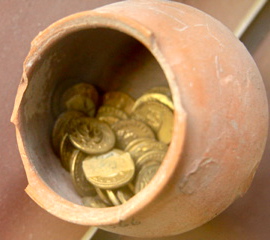Everyone has a moment where they question the purpose of life, often a moment of depression or discouragement. Sirach today presents a list of wonders from the Lord today in the First Reading that helps us see our life as one big gift basket:
The gift of life. Our Lord created us, and he was not obliged to create us. As the most reasonable being ever, he had some idea in mind when he created us, which means we have some purpose in life to discover and enjoy.
The gift of being made in God’s image. God is pretty amazing, and he decided to make us like him. We’re a work of art depicting something wonderful.
The gift of time. We’re not living on borrowed time, but gifted time. Life is full of milestones, and we all have a deadline. Deadlines can make us amazingly productive, and the big deadline at the end of our earthly life will be the biggest milestone of all: it catapults us from here to eternity. Time is a gift, and each moment is a treasure.
The gift of his creations. The Lord has blessed us with all sorts of things in order to live, to grow, and to be happy. He’s given us so many choices of pets, but also many choices of menu. He’s given us wool sweaters, guide dogs, and hamburgers with all the trimmings.
The gift of understanding and creativity. He’s given us scientific knowledge that amazes us, movies, novels, paintings, and sculptures. He’s given us great things to discover and to share with others. He’d made us creative like him, and also made us inquisitive so that we seek him through his creatures and always strive to unravel mysteries.
The gift of knowledge beyond our immediate perceptions. We know, thanks to him, that there is a whole spiritual world underpinning our material one and also going beyond it. A world that makes life more than just a rat race of eat, sleep, strive, die. A world beyond the ordinary happenings of everyday life and any one life.
The gift of wisdom regarding good and evil. He’s given us a conscience to learn and to know right from wrong, not just because of the satisfaction or guilt it might bring, but as a path to true growth and happiness. He’s given us freedom to choose, but also the responsibility to choose wisely, the rewards that come from living a good life, and the consequences of living a bad one.
The gift of knowing and respecting God. He’s revealed himself to us, as we know from the first chapters of Genesis, and he’s shown us throughout history that he is amazing, loving, and worthy of our respect.
The gift of a relationship and covenant with him. He’s made the deal of a lifetime with us that he never rescinds. He never shortchanges us, and he shows us how to live a worthy life. He also warns us about living an unworthy life, and, like a loving Father, is always watching over us to keep us out of trouble.
The gift of a relationship and covenant with others. He’s also given us others like us so that we never need to be alone. He’s given us the gift of family, friends, society, and culture so that we can love and enrich one another. In the Gospel today we’re reminded about the gift of children, who teach us simplicity in striving for the Kingdom of God and the joy and purity of innocence.
Take stock of your gift basket today and give thanks to God. You’ll find at least one gift that makes your life worth living.
Readings: Sirach 17:1–15; Psalm 103:13–18; Mark 10:13–16. See also 19th Week in Ordinary Time, Saturday, Year II and 19th Week in Ordinary Time, Tuesday.





